By D.R. Barton, Jr., Technical Trading Specialist, Money Morning
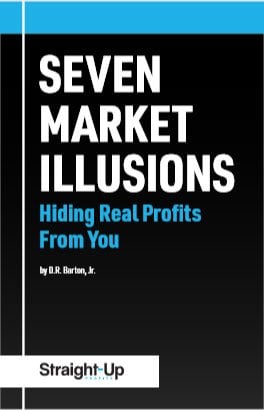
As investors and traders, we often rely heavily upon the information we find in various news outlets to guide our decisions. But what assurance do we really have that the stories we see every day are actually serving our best interest?
That's a question I've been encouraging my readers to ask themselves for a while now.
It all started back in November 2019, when I got completely fed up with the discrepancies in the stories I see peddled to everyday investors compared to what's really going on in the markets.
These stories can come from a number of places, but the usual suspects are those that have far greater resources than your average investor - like Wall Street heavyweights, the news media, Madison Avenue, and Big Government - and who use those resources to distract you while they scoop up the profits.
I've decided that the best way to use my 30-plus years of market experience for good is to wade through the swamp of distracting headlines to find the stories that really matter - and show you how to profit from them.
And that effort begins in earnest with this report.
Here are the seven biggest smokescreens currently being used to blind you to the real money to be made on Wall Street - and my recommendations for what to do with your money instead.
Let's begin...
Illusion No. 1: "Agriculture Will Never Recover"
The mainstream business news is laser-focused on the trade dispute with China. President Trump's fight with Chinese President Xi Jinping is just about all you heard or read about in the business news over the last year.
But there's a much more important story developing right behind all of the trade war headlines, right in America's heartland. It's an outrage that no one is talking about this.
What some of America's farmers are facing today is beyond anything in recent memory. The little-discussed consequences of the trade war on small American farmers have sent U.S. agriculture into crisis mode.
When China responded to Trump's tariff flurry by putting a 25% tariff on agricultural imports from America - and simultaneously started buying agricultural products from elsewhere, especially Latin America - farmers here felt the pain.
The numbers speak for themselves.
Across America, farm bankruptcies have shot up 24% to the highest rate since 2011, and total farm debt is just below its 1980 record high.
And delinquencies are definitely rising for agricultural loans:
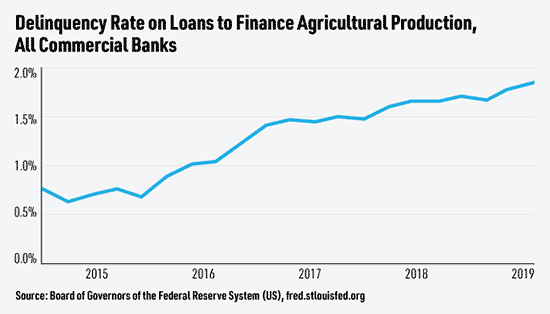
For consumers, lower agricultural prices are a good thing. But it means that farmers are on razor-thin profit margins with little to no cushion when something bad happens.
And unfortunately, the trade dispute with China has hit American farmers the hardest. All in all, total farm income is almost one-third below its 2013 high.
With the 2020 presidential election approaching and farmers having voted heavily for him in the last election, chances are that U.S. President Donald Trump will continue to try to help farmers.
That's why he keeps talking about China having to buy soybeans and other American farm goods as part of any trade deal.
When that deal comes and shipments of American farm products start flowing again, the relief to American farmers will be huge.
It could also benefit your wallet...
The Real Story: Huge Profits Await These Agricultural Stocks...
The recent signing of the phase one trade deal between the United States and China, including the agreement that China will purchase at least $32 billion of American farm goods over the next two years, should create a huge demand boost. And when demand goes up faster than supply, so do prices.
Archer Daniels Midland Co. (NYSE: ADM), a company that stores, processes, and sells farm commodities, will benefit greatly from a trade deal. It was slightly up in 2019 and has a dividend yield of just over 3%.
Once the profits from the trade deal start coming in, its business will boom, and the stock price should follow.
A similar story is likely for Deere & Co. (NYSE: DE), the famous manufacturer of farming machinery. Deere has suffered as farmers make do with older equipment because they have to, for now.
But all that demand still exists, and once money starts flowing to American farmers again, that pent-up demand should see Deere's business shoot up.
Both of these agricultural plays are well positioned to deliver profits as trade tensions with China continue to ease.
Illusion No. 2: "The Trucking Industry Is Dead"
In addition to every business that traditionally made up the need for goods to be moved from one place to another - like factories, restaurants, offices, etc. - the rise of e-commerce has necessitated a massive shipping infrastructure to meet the increased demands of today's consumers.
To move as much freight as our economy demands, an army of trucks (and drivers to operate them) is needed. In 2017, trucks carried roughly 70% of all goods moved around the United States.
That's why what's been happening over the last year is so alarming...
The trucking industry had a horrendous 2019, with many in the industry characterizing the last year as a "bloodbath."
After roughly 640 trucking companies declared bankruptcy in the first half of the year - more than triple the amount from the same time frame in 2018 - the pain has continued for the once-thriving industry.
The most recent blow came in early December, when trucking giant Celadon - which employs nearly 3,000 truck drivers - announced that it was bankrupt and had effectively closed its doors. The shuttering of Celadon is the largest trucking sector bankruptcy ever.
In all, 795 trucking companies failed in 2019, and more are expected to do the same in 2020.
Much of the squeeze in the trucking industry this past year can be blamed on falling demand from the highs of 2017 and 2018. Many trucking companies borrowed and spent large amounts of money to expand their businesses after the boom from the prior two years, only to find themselves overextended as slow industrial growth and trade tensions contributed to a decline in shipments.
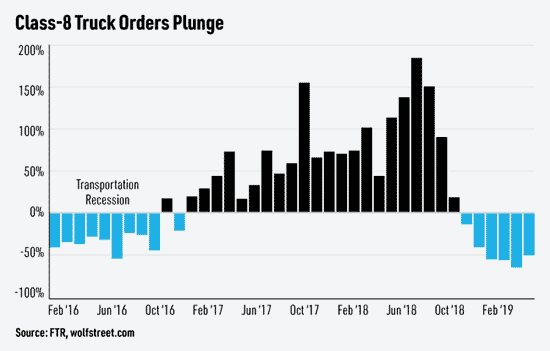
But there's another major factor contributing to the struggles of the trucking industry...
According to a study by the Bureau of Labor Statistics, truck driving ranks as the seventh most dangerous profession in the United States. In 2016, the latest year in which data is available, 660 large truck occupants died in crashes.
In addition to the threat of traffic accidents, truck drivers must also contend with a number of factors that can contribute to an unhealthy lifestyle while out on the road.
Nearly seven in 10 truck drivers are obese, and almost two-thirds of long-haul drivers reported having at least one health risk factor such as hypertension, high cholesterol, and less than six hours of sleep per day.
These issues, combined with relatively low wages, have led to a scarcity of new truckers to take over for an aging workforce. The American Trucking Association estimates that 160,000 driver positions will go unfilled in a decade.
But what's not being included in many of these gloom-and-doom stories about the "death of trucking" is how the companies that rely on those truckers are dealing with it. Reading the headlines about the trucking industry would have you believing that you'd want to avoid any business that's heavily reliant on trucking.
But that's simply not true. Several of the world's biggest retailers are revolutionizing how their goods are shipped.
And it could mean big profits for investors that get in now.
The Real Story: There Are Big Profits in Store for Trucking Innovators
For the last several years, startups and giant corporations alike have been testing various types of self-driving vehicles. With artificial technology advancing faster and faster, the main aim is to reduce human error in driving, prevent collisions, and save lives.
And perhaps the place where that will have the biggest impact will be in one of the most dangerous, unhealthy professions - truck driving.
Two of retail's biggest movers of goods are already experimenting with automated vehicles for their shipping needs, and the effort could result in huge savings.
Large cargo trucks with the logo of the world's largest online retailer, Amazon.com Inc. (NASDAQ: AMZN), have been spotted being hauled by autonomous driving startup Embark's vehicles since early 2019. While a truly autonomous vehicle (without the need for a human driver present) is admittedly still a way off, achieving it could mean massive savings for Amazon, which has seen its shipping expenses increase by $15.5 billion since 2015.
Walmart Inc. (NYSE: WMT) has already proven itself to be a master of logistics. But even this massive retailer has trouble turning a profit from online sales due to high shipping costs. In an effort to curb those costs, WMT is experimenting with automated vehicles aimed at cutting its middle-mile (the distance from the warehouse to brick-and-mortar stores) shipping costs in half.
According to a study by McKinsey Global Institute, automated deliveries would slash retailers' shipping cost by 40%. Watch for any advances in driverless technology, as they will spell big profits for these companies and more.
Illusion No. 3: "Real Estate Is Overpriced"
Over the course of the last year, you've likely heard quite a few people (particularly politicians) shouting from the rooftops about record-low unemployment and job growth in the United States. The unemployment rate dropped to 3.4% in May 2019, a low not seen since the 1960s.
While creating more jobs and hiring more employees to fill them is certainly a great thing, there's a major detail about these jobs numbers that's being glossed over.
Now, when you hear that jobs are up and unemployment is down, you might naturally assume that this is the case for most of the country. Plenty of politicians would love to take credit for higher job creation numbers as the next election nears - even if the stats have nothing to do with their districts. And that's exactly why you're only being told part of the story...
In reality, most of the growth in jobs and employment is happening in a handful of cities that can offer careers in high-paying, innovative fields like technology, telecommunications, and scientific research - just to name a few.
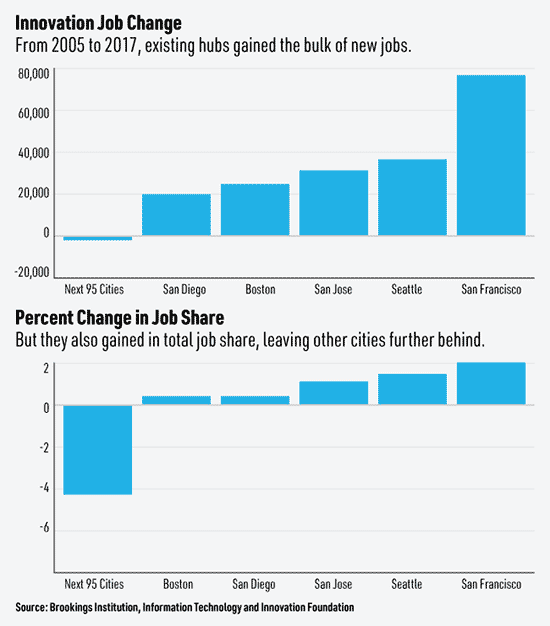
With such incredible jobs growth in these select cities, naturally, the demand for housing has gone up.
And as I mentioned before, when demand goes up, so do prices. So it's no wonder that real estate costs in these areas have increased dramatically in recent years. For example, the median home value in San Francisco rose an incredible 90% over the last 10 years.
This has led some analysts to speculate that the real estate is overpriced and thus not worth your investment dollars.
Well, I'm here to tell you that if you want to make real, life-changing income, investing in these markets is one of the best ways to do it.
The Real Story: You Can Bank Stable, Consistent Real Estate Income
Look, housing prices in these cities are going to keep going up. Ignore the stories about "overpriced" real estate markets. People are moving there for the best jobs around - and with some of the highest salaries in the country, they can afford the housing.
But what's the best way to invest in the real estate market? In my opinion, you can't beat real estate investment trusts (REITs).
A REIT is a trust that owns income-producing real estate. REITs are an extremely safe, liquid investment bought and sold on public exchanges and not correlated to the movement of the stock market - meaning even if the markets fall, REITs will continue to generate income.
Best of all, the IRS requires REITs to pass on at least 90% of their earnings to their investors (That means you!) in the form of dividend payments.
Here are my favorite REITs that take advantage of the booming real estate market...
Ladder Capital Corp. (NYSE: LADR) writes mortgages for commercial properties and invests in commercial mortgage-backed securities. Ladder's dividend payments, since they began in 2015, have climbed ever higher. Payments have increased a considerable 36% in the last three years. The company has even paid out three special dividend payments in that time!
Arbor Realty Trust Inc. (NYSE: ABR) is a REIT and direct lender that provides loan origination and services various real estate assets. ABR's holdings have taken root all across the United States, giving it good geographic diversity and a portfolio that is well insulated from localized real estate downturns. At its current share price, ABR offers a phenomenal 8.46% annual dividend yield.
Illusion No. 4: "There's No Future in Boeing"
One of Wall Street's biggest falls from grace this year has been what's happened to Boeing Co. (NYSE: BA).
At the heart of the massive decline in Boeing's share price - to the tune of $4.3 billion in lost market value - are the two high-profile crashes of its 737 Max airplane, in which 346 people died.
The ensuing investigation into the crashes revealed some stunning lapses in judgement in pursuit of profits. This included Boeing offering two warning indicators that alert pilots to problems with the flight control software as optional extras, for a price.
A lack of oversight can also be blamed for the shortcomings of the 737 Max. The Federal Aviation Administration has received a great deal of criticism for effectively allowing Boeing to certify its own aircraft as safe.
After months of investigations and delays to the efforts to fix the problems with the 737 Max, the planes have still not returned to service. In late December 2019, after the loss of billions of dollars and with FAA recertification of the 737 Max likely still months away, Boeing announced that it had fired its CEO, Dennis Muilenburg.
Combined with Boeing's decision to halt production on all new 737 Max aircraft, many have begun to wonder if Boeing will ever recover or if this is the beginning of the end for the largest American air framer.
The same people that keep highlighting Boeing's problems are likely also buying up its stock at the same time.
That's because while fear is keeping you on the sidelines because of so many negative headlines, there's a really compelling argument for an eventual revival in Boeing's stock...
The Real Story: Boeing Is Too Big to Fail
Think what you will about the scandal that has rocked Boeing for the better part of a year now...
But the truth is there is simply no way the U.S. government will allow Boeing to go under and disappear, leaving the international aircraft industry completely in the hands of Boeing's only major competitor, European-based Airbus.
For years, Boeing has been the biggest beneficiary of state and local tax breaks, totaling over $14 billion, in addition to $70 billion in federal loans. And with the incredible economic weight that Boeing carries, don't expect the preferential treatment from the government to stop anytime soon.
Boeing employs over 150,000 workers in the U.S. alone and makes up about 0.3% of the total GDP. There's also Boeing's impact on other companies to consider. According to Boeing's website, in 2016, Boeing paid nearly $45 billion to more than 13,600 businesses, supporting 1.3 million supplier-related jobs in the United States.
While it may not ever come to needing a bailout from the federal government, with such a massive economic footprint, you can be sure that the U.S. government will do everything in its power to ensure that Boeing recovers from this dilemma.
As many shareholders have let panic take over and sold off their shares in Boeing, smart investors will use the pullback as a phenomenal entry point for the inevitable comeback.
Illusion No. 5: "Silicon Valley Is Feeling the Heat"
Investigations (or threats thereof) into some of the biggest names in the tech sector have cast a huge shadow over Silicon Valley.
On everything from election coverage and health tracking to advertising and encryption, tech companies like Facebook and Google are getting slammed and threatened with regulation.
Facebook, after years of being a shining beacon of tech innovation and inspiration, is currently embroiled in four separate antitrust investigations and calls for the company to be split up - even from Facebook's co-founder, Chris Hughes.
Tech giant Apple has also come under fire for what some competitors characterize as unfair business practices in the App Store - the only way third-party software can be downloaded onto an iPhone. Apple has been accused of charging fees to some software developers for user downloads while exempting others, as well as unfairly ranking its own apps higher than competitors' in search results.
Most recently, Google has had its own share of headaches over its recent bid to purchase fitness tracker maker Fitbit Inc. (NYSE: FIT). Watchdog groups have argued that Google having access to Fitbit's data on user health information would give Google even more data than it already has on American consumers, which could then be sold to the highest bidder.
But despite all of the spectacles and threats of crippling regulation currently swirling around them, there's still reason for optimism in their stock prices...
The Real Story: Time Is on These Silicon Valley Giants' Side
It's no secret that there is a major rift right now in the U.S. government. New headlines appear daily which highlight the struggle of the Democrats and Republicans.
Don't worry; I'm not about to launch into a political tirade here. Instead, I'll focus on what this all means for Wall Street - and how you can profit from it.
With an ineffective congress mired in partisan infighting, nothing is going to happen with these investigations in the next year. Unless a very progressive wave sweeps the House, Senate, and presidency in 2020, the tech giants will be just fine.
And even if it does, they'll still be at the top of the economic food chain. In either event, these massive tech companies are the only ones with enough money, know-how, and Silicon Valley clout to invest in the next big things to come out of Silicon Valley.
So look past the grandstanding on Capitol Hill and invest in these companies when they dip because of temporary bad press. Buy Apple, Microsoft, Facebook, and Amazon on every pullback to trade or for long-term investment. Your portfolio will thank you in the end.
Illusion No. 6: "Trade Volatility Will Soon Quiet Down"
Even the most casual market observer has surely noticed that headlines and big market movements have been dominated by U.S.-China trade deal news for more than a year now.
Since the tit-for-tat tariffs and retaliations between the world's two largest economies began, traders and investors have had to endure roller-coaster ups and downs on every bit of news surrounding the negotiations.
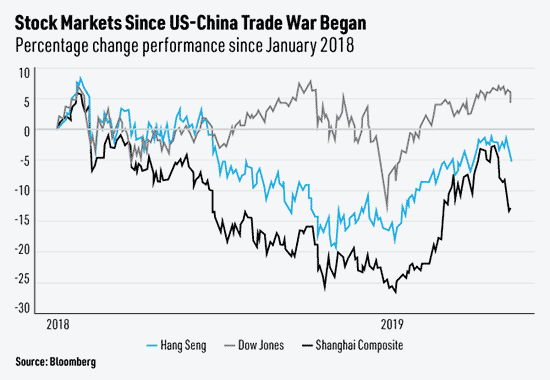
Recent headlines about the phase one deal and future resolutions paint a deal with China as a light at the end of the tunnel.
But unfortunately, we may still have a long way to go in the dark...
That's because ever since President Trump was elected in 2016, his administration has effectively been causing the death of the World Trade Organization (WTO) by blocking the appointment of any new judge to the appellate body - which is responsible for settling trade disputes between nations. Now, with less than the legally required three judges left, the WTO has been rendered unable to rule on any new trade dispute cases.
The kind of volatility that the China trade dispute is causing may well become the new normal for Wall Street as more and more trade deals are sure to be renegotiated under unregulated international trade practices.
This is being pushed as a negative by most media outlets out there. Sure, it will have its downside as the new trade deals are hammered out, but the eventual benefit to a number of U.S. industries will be remarkable.
While protectionist practices and trade bans ultimately hurt the growth of the global economy, there is one reason why this new "law of the jungle" style of international trade will give the U.S. a huge advantage.
And savvy investors will be ready to reap the rewards...
The Real Story: The U.S. Has the Upper Hand without the WTO
Forget about the trade dispute with China. Global trade rules between the major economies of the world are about to get massively rewritten - with U.S. interests at heart - as the WTO stops being able to function.
As NAFTA is replaced and Trump's tariffs bring country after country to the negotiating table, the immense size of the U.S. economy - which many countries rely upon to export their goods and services to - will be used to leverage deals that heavily benefit U.S. industries.
Under this new order of international trade and the favorable trade deals that will come with it, the businesses that stand to benefit the most will be U.S. companies that export to other countries the most.
The semiconductor industry is one that I've been touting as a great growth opportunity for some time now. Intel Corp. (NASDAQ: INTC), maker of some of the most advanced processors anywhere, is one of the biggest U.S. exporters. INTC has grown its export revenue from $44.89 billion in 2011 to $56.55 billion in 2018 and is expected to continue that trend as global demand for technology increases.
Johnson & Johnson (NYSE: JNJ) is a storied multinational consumer products company with a strong pharma wing as well. Its export business has also grown impressively over the years, with a 68.57% increase in revenue from 2006 to 2018.
An investment in these massive exporters will position you well to reap a windfall as trade deals that benefit the United States are renegotiated.
Illusion No. 7: "Retail Is as Dead as the Dinosaurs"
We've already discussed how the rise of e-commerce created a boom in demand for trucking capabilities to move all of that cargo. But online shopping has had an even bigger impact in its own sector.
Since the advent of e-commerce, more and more consumers have found that they prefer the convenience of online shopping to traveling to a retailer's physical location.
The result has been characterized as "The Death of Retail," whereby the traditional brick-and-mortar stores have been supplanted by websites and speedy, consumer-direct delivery. Once-prosperous companies that were seen as the giants of retail, like Sears, Macy's, and J.C. Penney, have struggled to evolve with the changing consumer behavior.
And those titans of retail aren't alone. Some of the numbers are truly shocking...
In 2019, a staggering 9,302 retail stores closed their doors - a 59% increase from the number of store closings in 2018 and the highest number since data collection on store closings began in 2012.
But that's only part of the story. The gloom-and-doom headlines you see do a great job of grabbing your attention, but what they don't tend to mention is how the retailers that remain are thriving - and how you can make money from them...
The Real Story: Retail Success Just Looks Different Now
Now that the smoke from the battle of the retailers has cleared, only a few are left. And only a few are "haves" that are prospering and growing. Those that remain with brick-and-mortar locations have been successful in also blending e-commerce options for customers into their business model.
The rest are "have nots," and despite having survived the "Death of Retail," they're not long for this world. So make sure you short the "have nots" - but more importantly, don't be scared away from all retail stocks. The retail "haves" are growing, and there's money to be made.
Here are some of my favorite retail "haves..."
Amazon.com Inc. (NASDAQ: AMZN), Walmart Inc. (NYSE: WMT), and Target Corp. (NYSE: TGT) will continue to thrive. But here are others that are winning thanks to strong management teams and best-in-class niche performance:
Best Buy Co. Inc. (NYSE: BBY) is one of my favorite brick-and-mortar retailers because it is one of the few remaining places where consumers can touch and test electronics before buying them - a niche that online retailers can't offer.
TJX Cos. Inc. (NYSE: TJX), owner of such popular retail outlets as TJ Maxx, HomeGoods, and Marshalls, is another company that's survived the death of many of its competitors. TJX is a well-run discount retailer that's doing it right.
Costco Wholesale Corp. (NASDAQ: COST) boasts a market cap more than twice the size of Target's, is still growing faster, and is extremely well-run.
I sincerely hope that not only will you use this information to trade the companies I've recommended and achieve great profits but also to start to question for yourself the stories that you see every day.
As we continue along, you can rest assured that I will continue to help you wade through all of the narratives that do nothing but distract you, and work to bring you the stories that REALLY matter.
And of course, I'll show you how to make big, fast profits from them...
Great trading, and God bless you,

D.R. Barton, Jr.


